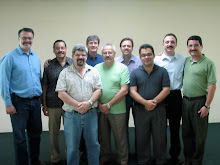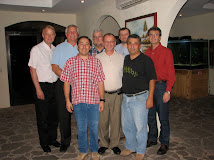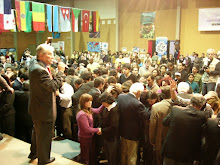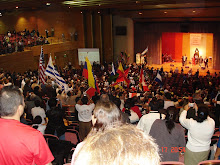A New Chapter of the Acts of the Holy Spirit
A time for gratitude
A church that experiences the work of the Holy Spirit
“And the hand of the Lord was with them, and a great number believed and turned to the Lord.” (Acts 11:21).
To begin with, we want to give glory and thanks to God for the Iberoamerican church. It is a church that makes us think and reflect. It is a church that reflects what the Antioch church lived in Acts 11. They experienced the power of God, and a great number believed and turned to the Lord. The church was established there because they spoke of Jesus Christ as the message of the good news of peace. Some people in Cyprus and Cyrene were bold enough to make a difference speaking with the Greeks, and not only the Jews. The church was established in Antioch as the result of a group of men and women without money, without plans, who left Jerusalem and headed to the coast, until they arrived at Antioch, sharing Jesus Christ.
A church that lives under the influence of the Holy Spirit is a church that edifies, is solid, has vigor and an effective testimony, and grows.
We give thanks to God that the Iberoamerican church has an evangelistic emphasis and and from it new churches are being formed. It is a living church that is growing, joyful, flexible, and has a young leadership with impetus and initiative. It is an enterprising and creative church. It is a united church that worships the Lord. It is a church that evidences the grace of God through its acts. It is a church that gives men and women opportunities.
In recent years, the church in Iberoamerica has been awakened to social responsibility. This characteristic has been one of the greatest contributions to Latinamerican theology: the emphasis on the reality of the kingdom of God.
The church has been established as a product of the work of the Holy Spirit and of missions work. Many men and women share their faith in Jesus Christ. Everything is very spontaneous. Iberoamerica loves the Lord. God is the one who causes others to know the Lord. The great hero in Iberoamerican missions is the Holy Spirit.
The nationalization of leadership in the first half of the 20th century and the rise of national churches, in the 1930s, were other decisive factors for the development of structures that were ecclesiastic, contextualized and effective. The Holy Spirit is working in the life of the church. It is working in these structures, to reform them and to renew their faithfulness to the mission. The significant thing, however, is not the structure but its mission.
There are different sources of information that confirm that the total in the evangelical community in Iberoamerica in 1900 was 50,000 believers. In the Edinburgh Congress in 1910, there wasn’t any representation from Latin America. During the last century, the growth is reflected in these numbers: 1916: 378.000; 1925: 756.000; 1936: 7.200.000; 1967: 14.746.200; 1973: 20.000.000; 1987: 37.432.000; 2000: 80.000.0001.
A church that begins to separate, recognizing those that are elected by the Holy Spirit:
We give thanks to God because many of the Iberoamerican churches have heard the voice of the Holy Spirit, setting apart hundreds of Barnabases and Sauls for the work to which God has called them. We give thanks to God for the hundreds of obedient brothers and sisters in Christ who are obedient to the voice of the Holy Spirit, who have left to preach the gospel, as John says in verse seven of his third letter: “because they went forth for His name’s sake, taking nothing…”
We give thanks to God for the hundreds of brothers and sisters who have helped them to continue on their way, co-laborers with them in the Truth. As Paul expresses in Titus 3:13: “Send Zenas the lawyer and Apollos (bi-vocational and career missionaries) on their journey (to the nations) with haste, that they may lack nothing. And let our people also learn to maintain good works, to meet urgent needs, that they may not be unfruitful.” We give thanks to God for the thousands of families that have helped cross-cultural workers.
This is our Iberoamerican experience, and now, as we are going to the nations, we maintain this faith: “And the hand of the Lord was with them, and a great number believed and turned to the Lord.” (Acts 11:21).
A time of dangers and risks
Acts 14:8-18 says, “Now when the people saw what Paul had done, they raised their voices, saying…‘The gods have come down to us in the likeness of men!’ And Barnabas they called Zeus, and Paul, Hermes…”
In Lystra a miracle takes place that leaves the crowd shocked: there was a paralytic, who was born lame, and who had never walked. Paul orders him, in a loud voice, “Stand up straight on your feet!” The result of this miracle was that they treated the servants of God as gods. Paul and Barnabas tell them that they are only men, and that the people must return to God. With these arguments, they are able to dissuade the crowd.
The danger and risk that they ran in those days is the same that we have in Iberoamerica and in our cross-cultural fields. What happens is that people try to transfer their admiration and adoration that only belongs to God to the people that God has sent as messengers. The problem can be even greater if we stimulate these feelings. There are times in the life of the church when little empires are built. They attract followers of people or institutions, but not of Jesus Christ. The church in Iberoamerica has confronted various dangers like:
-Power and competition
Many times churches live a miserable fight for power, loving power instead of the power of love. Other times functionality has distanced them from Biblical principles. They search for results where people are valued for what they produce in their jobs in the least amount of time. This type of theology of productivity is affecting and creating a prejudice in the formation of pastors and missionaries. It tries to train them in the least amount of time possible. Ministerial success shows results and not a life of humility. The act of allowing Christ to grow, where we are invisible, doesn’t enter in this type of life. This type of living causes competition that demands production. Competition distances churches, and creates jealousy within itself. The unity of the body of Christ is affected by this structure. The consequences are seen: pressure and tension lived in the churches, pastors and missionaries. This can grow to create a secular and mundane environment.
We are not called to form business stereotypes based on utilitarianism, mercantilism and of numbers. Multiplication, numbers and percentages are not synonymous with transformation. We must not sacrifice the demands of the gospel on the altar of numbers. We are living in times that seem like some churches have clients, and like businesses, they are always right. It is the clients that are always content and are the center of everything. We want to encourage people to break these productivity schemes and think in kingdom terms. We want to encourage them to preach the Word of God and give a message that leaves us uncomfortable, causing us to examine our walk with Christ. The concept of success for Jesus was: “Father, I’ve done everything you told me to do.” The results are random. Jesus healed some and others not. He fed many, and others were not sustained. Denying ourselves, knowing Jesus Christ and being like Him in His death is transforming power (Philippians 3:10).
-Lack of teaching the Word of God
We have also observed that sometimes there is a lack of teaching the whole Word of God. In some cases, the practice of discipleship has been little and Bible studies make reference to isolated texts, fragments. Many times, too, we observe syncretism (the combination of differing doctrines), spiritual malnutrition, heresies, superstition, division, etc.
According to the comments of Bertil Ekström, the executive director of the World Evangelical Alliance (WEA), we see that yes, we have grown statistically. But to grow in size is one thing, to grow in maturity is another. Mere numeric growth has changed the objective as such, and for many, the objective justifies the methods. When whatever method that helps grow the membership of the church is valid and the search is for the most effective strategies, the gospel has been minimized and puts Biblical principles at risk.
-Authoritarian leadership and form of government
Iberoamerican leadership sometimes follows the tendencies of global charismatic leaders (with a strong personality and the power to convince), principally centered on founding one’s own church. The authoritarian leadership of our history continues to be a reality. Diverse research has demonstrated that churches with autocratic and charismatic leaders are the ones that grow the most. At the same time, a new generation of leaders exists that are looking to work in teams, and are much more concerned about quality and a participative local church. The political democratization in our countries is reflected in the churches – and also in schools and other institutions – and individuals these days don’t accept, in the same way, the dogmatism of an autocratic leadership. The church needs to reflect on its form of government and the ways its leadership functions. The exercise of leadership in the life of local churches must be marked by the model of the suffering servant – which is not to be interpreted as weak, but that its lordship is under the auspices of the example and guidance of the Lord Jesus Christ – and evidences it in contrast to an authoritarian leader and other dangers caused by power abuse.
A time for profound challenges
Acts 13:1-3 “Now in the church that was at Antioch there were certain prophets and teachers: Barnabas, Simeon who was called Niger, Lucius of Cyrene, Manaen who had been brought up with Herod the tetrarch, and Saul. As they ministered to the Lord and fasted, the Holy Spirit said, ‘Now separate to Me Barnabas and Saul for the work to which I have called them.’ Then, having fasted and prayed, and laid hands on them, they sent them away.”
From this story, we know that the church of Antioch played a very important role in the life of the universal church of the first centuries. It was a church that crossed social boundaries, built up broken lives, covered physical and spiritual needs, resolved interpersonal and doctrinal conflicts as described with the Jerusalem Council, had a shared leadership forming a pastoral team, and was willing to extend the limits of the kingdom to the ends of the earth.
We wonder as a church: What will be the work for which the Lord has called us in the coming year, and the new challenges that He will place in our hands? What is the direction we must go, and how must we plan for it? How can we understand that we are a church on mission? Who must we appoint for the ministry? How will the next pastors and cross-cultural missionaries be? Antioch was an open door for the evangelization of the world. We as Iberoamericans are challenged to follow this model.
The church living in mission is a church that understands itself to be sent to the world. It is a church that looks for God’s purposes, participating actively in worship of the Lord, called to live a Trinitarian faith, a relational faith, a life in relation with God and with our neighbor; a relation of communion with one another, where our priority is in being, not doing.
As servants, we understand that when we are involved in the mission, we are sharing the mission of our missionary God, and we are not working for any personal project. We are in the service of the Missio Dei, and our mission is to share His. We listen, we discover and we obey the voice of the Lord, sending His servants to the work to which He has called them. This is the model to follow (Acts 13:1-3).
It is interesting when we study the book of Acts to observe how the church goes through stages; the church in Jerusalem was the initial center of the activity of the church, then Antioch. After the persecution, the action center moved from Antioch to Syria. Jerusalem had its moment, and now it was coming toward a new era in which it would be necessary to respond to the unreached, and it is then that the church in Antioch assumes this commitment. Luke talks about this congregation not because it is the richest or the most powerful, but because it knew how to accept the challenges of the moment.
Later when we read Acts 15 we find the difficulty that some Christians coming from Judea who visited Antioch had with Jews who were not circumcised and therefore believed they could not be saved. Paul, Barnabas, and some other believers sent by the church decided to resolve this conflict of values in the Council of Jerusalem. What is the reason that Paul, Barnabas and those that were with them could see what God was doing among the unreached, and, on the other hand, the Pharisees could not? They had accepted Jesus as the Messiah and participated in the life of the church. Where was the difference? The radical difference was in that, while the Pharisees had received the gospel, the church of Antioch, in addition to receiving it, had united with the mission of God in the world. And from there was thrust the missions endeavor. The Spirit was active in Jerusalem, but it was in Antioch where the Spirit was doing new things, opening doors and expanding horizons. There the church was subject to the impulse of the Spirit.
-The missions of all the people of God
Every Christian is called to participate and exercise the universal priesthood of believers. The mission has its place wherever it wants. Impelled by faith, the Christians crossed the border between those who believe and those who don’t believe, and on the other side of this border they gave testimony of their faith. Today, as a church, we are confronted with great challenges, like the 4,000,000 people who still do not know the Lord. The church in Iberoamerica must fully assume, without delay, its responsibility in world evangelization. It is a command, because there are millions of people that still do not have access to a clear presentation of the gospel. The church together is responsible for the evangelization of all people and races, of all languages. A universal faith, but one that is not a missionary faith, is nothing more than rhetoric without authority that makes it sterile. To complete the work demands that we cross geographic, cultural, social, linguistic and spiritual borders, and that we accept all the consequences that requires.
-Dimensions of a new missionary paradigm
The challenges also include great multicultural cities, the re-evangelization of the West, testifying in the world of religious plurality among unreached ethnic groups where they are found (whether that be in large cities or in restricted access countries); linguistics and translation, contextualization; being agents of reconciliation in a world of violence, of displaced people, of refugees, of immigrants, in the midst of religious persecution and an immense amount of suffering. More Christians died in the 20th Century than in the previous nineteen centuries.
We must assume our role in questions of the environment and all of God’s creation; this challenge implies also responsible and effective participation in Iberoamerican society; the deepening of Biblical knowledge through systematic teaching in local churches, and the maturing of leadership models that promote teamwork and active participation of believers. We need to have a real understanding of the unity of the people of God, a greater participation in the world missions movement, becoming participants in the universal church, sharing the global challenges in an integrated action of the gospel; a sincere search for cooperative models; and we need to understand missions as a process and not as a project.
-Missions mobilization
In the first COMIBAM (Iberoamerican Missions Cooperation) Congress in San Pablo, Brazil in 1987, they estimated the Iberoamerican missions movement to be approximately 60 organizations that sent some 1,600 cross-cultural missionaries.
Ten years later, in preparation for the second COMIBAM Congress in Mexico in 1997, a more systematic research was done with the goal of evaluating the missions movement of the past decade. It was concluded at that time that there was more or less 300 sending organizations and a little more than 4,000 cross-cultural missionaries.
According to statistics from 2008, Iberoamerica has more than 12,500 missionaries sent to other fields, and some 400 sending organizations. We give thanks and glory to God for this growth, but we are also conscious that missions mobilization continues to be one of our principle challenges.
We are a capable missions movement, but we are still not a missions movement that has come to a point of developing all of its potential to bless all nations. Despite the number of Iberoamerican evangelicals (70 millions), still we observe that there is not a correlation with a greater sending of missionaries to the least evangelized or unreached peoples. At the same time, there is a growing concern about the sending of missionaries without adequate training, without strong financial support, adequate pastoral care and provision for their return.
-Unity and cooperation
The Word of God encourages us to live worthy of the calling which we have received. We are challenged to live in humility, being kind, patient, and tolerant of one another in love. We are challenged to maintain unity in the bond of the Spirit. One body, one Spirit, one Lord, and one God and Father of all (Ephesians 4:16). From the beginning, the Lord has challenged us to work in team. The mission could be the foundation for our unity. Cooperation in the practical task of missions is the first step towards a deeper unity. We will grow in our testimony based on the unity of Christ, that calls us all to participate in God’s mission.
But speaking of a global cooperation raises some questions that we must answer: Will we mutually help one another? How can we build a better missions bridge of cooperation? Should our structures be improved, changed or suspended? Should we rethink our missional understanding in order to better our missions dialog? What will be our participation in the sending of missionaries from the third world to other continents or the West? What principles and values must we follow? What is it that we must do? What is the cost that we must pay? What is our calling and what is our passion?
-Participate helping others through cooperation
The passion of the gospel must make us participate, cooperate and share (Philippians 1:5), and not to compete. We can speak of “communion,”– koinonia, the New Testament word translated as communion, sharing, contribution, or in common. What is clear is that the idea is of sharing something, a business, a purpose, an experience, money, whatever, but it must be shared. The apostle Paul says, “Brethren, join in following my example, and note those who so walk, as you have us for a pattern.” Common faith must have an expression in practical participation and this participation has concrete consequences.
We are called to serve one another because of the passion we have for the gospel. We need each other (I Corinthians 12:21-22). We are members one with another. No one can say to another, “I don’t need you” (2 Corinthians 10:12, 17-18). This is sin and we must repent. Our problem, many times, is to think that we don’t need anyone, and we miss out on sharing with others.
So that cooperation can exist, there needs to be a level of trust that is difficult to build when someone seems to be self-sufficient. The beauty of the incarnation of Jesus Christ, being God, is that he humbled himself voluntarily, to be among us.
We ask ourselves: how can we build a better missions bridge of cooperation?
In theory, the answer we have is that we must relate to one another. The problem comes when we don’t appreciate the relationship we have with others. We must have unanimity with the Father’s plans (Luke 6:27-31). This unanimity with Him speaks to us about being like-minded and being of one accord (Philippians 2:1-11). We speak of forgiving one another, of humbling ourselves, of understanding our different cultures and mutually helping one another. There is no one who is better, no one inferior. It also means that we have to work on better communication, on face-to-face relationships. Our problem is that many times we don’t appreciate personal contact, and we say to ourselves, “Why am I going to go see him/her?” “Why waste the time?” As servants, our presence, our commitment, our flexibility and our cooperation and indispensable. Together with this, we must enrich the dialog among the body of Christ: the global church. There is no North or South, East or West, there is only one body. When we serve through cooperation we can say what the apostle said of Epaphroditus, “a sweet-smelling aroma, an acceptable sacrifice, well pleasing to God” (Philippians 4:18).
The fact that we can decide together to do missions would be a sign of the defeat of Satan and evidence of unity and global cooperation. The fact of what we can do together with our differences in cultures, of wealth, of backgrounds; will require the help of the Holy Spirit and the willingness to sacrifice our own needs for the best of the mission. We are from different countries challenged to be citizens of heaven (Philippians 3:20) and this reminds us that we have a future in common and the same identity.
What is our calling and what is our passion?
The problem that we have many times is that we lose our passion to participate, to cooperate, our passion for love and unity. Sadly, other times, we participate without passion, without love, without cooperation, and we cannot see with clarity the work to which God has called us. We must long for the church of Jesus Christ to be planted among all ethnic groups as an expression of the anticipated kingdom of God.
The counsel of the apostle is that we must behave in a manner worthy of the gospel of Christ (Philippians 1:27, Titus 3:8). This implies:
a. To be firm in the purpose to which we were called (Philippians 1:27)
b. To work in unity (Philippians 1:27)
c. To do it without fear of adversity (Philippians 1:28)
-How is your passion? How is your faith?
Without faith it is impossible to please God (Hebrews 11:6). We walk by faith and not by sight (2 Corinthians 5:7). Satan wants to trick us. He tells us that we will have needs, difficulties, things that will trip us up. But the Lord says, “Do what I tell you to, and I will take care of you.” We must not serve God thinking of how to take care of ourselves, but we must work for God trusting in His resources (Philippians 4:19). He wants to do something with the little bit that we have in our hand, as he explains in Matthew 14:17-20. The signs follow those who believe, and not the opposite (Mark 16:20). We advance in faith and God will be present, because He is faithful and the mission is His.
The present condition of the world is marked by suffering (Romans 8:18-20). We are now being called to participate in His sufferings (Philippians 1:29, Philippians 3:10, Colossians 1:24, I Peter 4:13, 16). To know that is to participate in it. Our life is always full of surprises. We never know what is coming next. It is when we are available to leave behind all that it costs us, to leave for another place, and then to start over with a new assignment and to continue in obedience to the Lord. This is the cost. Is it difficult to be in the center of God’s will? This must be our passion. “Brethren, I do not count myself to have apprehended; but one thing I do, forgetting those things which are behind and reaching forward to those things which are ahead, I press toward the goal for the prize of the upward call of God in Christ Jesus” (Philippians 3:13-14).
As a church, we take part in the mission of God in the world announcing that: “The time is fulfilled, and the kingdom of God is at hand. Repent, and believe in the gospel” (Mark 1:15). We will take the gospel to all nations until the Lord returns. This is our understanding of the mission, with the participation, with our eyes fixed on the kingdom of God.
Carlos Scott
Mision GloCal
1 Nuñez, E. & Taylor, W. Crisis and Hope in Latin America. Pasadena, CA: William Carey Library, 1996, p.161.
To see the local church taking the whole Gospel to the whole world.
Insignia de Facebook
Translate
Total Pageviews
About Me
Blog Archive
Popular Posts
-
Current Board of Trustees Carlos Scott Carlos Scott, Argentinean, is currently President of COMIBAM International, he also was the Director ...
-
WHERE IS COMIBAM INTERNATIONAL HEADING? STRATEGIC FOCAL POINTS CARLOS SCOTT AND JESUS LONDOÑO VISION: FOR THE IBERO-AMERICAN CHURCH TO BE A ...
-
¡Argentina World Missions Network Celebrates 25 Years! "Our commitment: until everyone knows" On Wednesday the 10th of October 20...
-
2007 Annual Report Carlos Scott Contributions to the Development of the Ibero-American Missionary Movement During 2007 we developed a serie...
-
GloCal Mission Glocal is a term that represents the fusion of Global and Local. It is where the local and global action get together in the ...
-
Bogota Colombia. The Great Conference of COMIBAM International (Ibero-American Missionary Cooperation) has concluded with more than 1800 pa...
COMIBAM International
Argentina - Basque Country

Praying for Basque Country

From Field to Missions Force
COMIBAM International is an evangelical interdenominational organization promoting cooperation and networking between all those involved in missions in Ibero-America (Latin America, Hispanic North America and the Iberian Peninsula). It is formed by Latin American Christians who are committed to the evangelization of the unreached. The practical expression of COMIBAM’s constituency in each country is known as a National Missionary Movement (NMM), a network comprised of churches, training centers and sending agencies. COMIBAM believes in shared leadership and continent-wide involvement.
Alicia and Carlos Scott

Videos about MISSION
https://drive.google.com/folderview?id=0BwBYmVWQvNXNejNyRUlaWDF6ZEU&usp=sharing
The Church in the Northeast of the Democratic Republic of Congo



















Board Comibam International

Marcos Agripino (Brasil), Jose Luis Ramirez (Mexico), Jason Carlisle (US), Carlos Scott (Argentina), Alfonso Medina (España), Ruben Suarez (Puerto Rico), Victor Ibagon (Colombia), Daniel Bianchi (Argentina), Luis Marti (El Salvador)





Board and Executive Committee at Comibam International

Edgardo Surenian (Argentina), Carlos España (Guatemala), Moises Lopez (Mexico), Jesus Londoño (Colombia), Federico Bertuzzi (Argentina), Ted Limpic (US), Cristian Castro (Costa Rica), Francisco Linares (El Salvador), Jose de Dios (Guatemala), Ruben Suarez (Puerto Rico), Marcos Agripino (Brasil), Jason Carlisle (US), Carlos Scott (Argentina), Alfonso Medina (España), Jose Luis Ramirez (Mexico), Victor Ibagon (Colombia), Daniel Bianchi (Argentina), Luis Marti (El Salvador), Omar Gava (Argentina)
The Mission Mobilization Task Force (MMTF) commissioned by the Mission Commission (WEA)
Trev Gregory, Carlos Scott, Duncan Olumbe, Hikari Matsuzaki, Jamie, Tom Mullis, Jo Jowett, Kannan, Mal Gold, Min Young Jung, Alison Clarke

Wycliffe & Comibam

Directors of Comibam and Wycliffe
Pastors Training

Region Caribe
Pastors COMCA Training

Guatemala, Panama, Nicaragua, Honduras, Costa Rica, El Salvador
Missions Congress in Central American

Pastors Task Force Group

Centroamerica
Pastors Consultation Dominican Republic

Pastors Networks

Comimex Mission Movement - Mexico

Missions Movement COMINHA US (Hispanic People in US)

Jason Carlisle
COMIMEX Network Mexico

Mission Movement in Mexico - January 2008
Argentina World Missions Network
¡Argentina World Missions Network Celebrates 25 Years!










People praying for the world






Daniel Bianchi Director of COMIBAM International for the Southern Cone


Dr. Luis Palau presenting the Word

Word of encouragement for the members of the Network

Carlos Scott, Ruben Proietti, Ciro Crimi

Stanley Clark

Members of the Network

People made decisions for missions





COMIBAM III Congress, Granada, Spain


Auditorium

COMIBAM III, Granada, Spain

Photos of Work at Missions Movements of Iberoamerican people
Carlos and Alicia Scott - Comibam Work:
http://picasaweb.google.com/misionglobalscott/Comibam
Congo 2008 - Comibam
http://picasaweb.google.com/misionglobalscott/ViajeAlCongo
Congress - Wasghinton Comhina US - Comibam 2008
http://picasaweb.google.com/misionglobalscott/CongresoMisioneroWashingthonComhinaComibam20080607202804?authkey=0Y0MBgRqBcA
Several Meetings inn Wasghinton DC , New Jersey and Boston. Comibam 2008
http://picasaweb.google.com/misionglobalscott/ReunionesMisionerasEnWashingthonNewJerseyYBoston20080607202804?authkey=55KRWt8JIpo
Alicia and Carlos Scott - Comibam
http://picasaweb.google.com/misionglobalscott/TrabajoComibamEnGeneral20080628222617?authkey=Iy5_FiwkzoU
Meetings North - South and Comibam Board, Richmond 2008
http://picasaweb.google.com/misionglobalscott/EncuentroRichmondJuntaComiteYAgenciasDelNorte20080607202804?authkey=OFo1kouz1P8
Global Mission
Spanish: http://misionglobalscott.blogspot.com/
Spanish: http://carlosaliciascott.blogspot.com/








